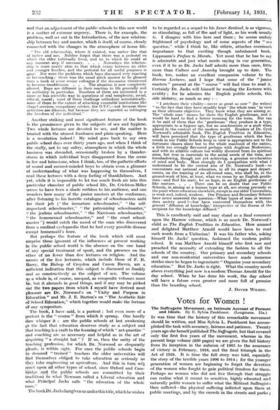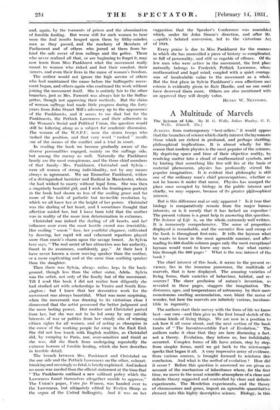Votes for Women !
The Suffragette Movement, an Intimate Account of Persons
and Ideals. By E. Sylvia Parildmrst. (Longman. 21a.) IT was time that the history of this remarkable movement should be written, and Miss Sylvia L. Pankhurst has accom- plished the task with accuracy, fairness and patience. Twenty years ago she herself published The Suffragette, but that covered only the first five years of the movement, whereas in the present large volume (630 pages) we are given the full history from its inception in the autumn of 1905 to the assurance of victory in February, 1918, and the final triumph in the Act of 1928. It is time the full story was told, especially the story of the terrible years 1906 to 1914 ; for the younger generation of women are beginning to forget the demotion of the women who fought to gain political freedom for them. Perhaps no woman who did not live through that struggle can realize what it meant to sensitive, highly educated and naturally polite women to suffer what the Militant Suffragists then suffered—the physical suffering inflicted upon them at public meetings, and by the crowds in the streets and parks ;
and, again, by the torments of prison and the abomination of forcible feeding. But worse still for such women to bear were the foul insults heaped upon them by filthy-minded. men as they passed, and the mockery of Members of Parliament and of others who jeered at them from be- hind the safe cover of iron railings and the police. Those who never realized all that, or are beginning to forget it, may now learn from Miss Pankhurst what the movement really meant to women who risked and lost their comfort, their mreers, and even their lives in the cause of women's freedom.
The author would not ignore the high service of others who had maintained the cause before the Suffragette move- ment began, and others again who continued the work without joining the movement itself. She is entirely fair to the other branches, just as Mrs. Fawcett was always fair to the Suffra- gettes, though not approving their methods. But the claim of woman suffrage had made little progress during the forty years from John Stuart Mill's advocacy up to the appearance of the Pankhursts, and it seems to me that but for the Pankhursts, the Pethick Lawrences and their adherents in the Women's Social and Political Union, the question would still be loitering along as a subject for academic discussion. The women of the W.S.P.U. were the storm troops who rushed the position, and that very word " rushed recalls one of the scenes of the conflict and a trial in court.
In reading the book we become gradually aware of the diverse personalities engaged, mainly on the suffrage side, but among the enemy as well. Naturally the Pankhurst family are the most conspicuous, and the three chief members of that family—Mrs. -Pankhurst, Christabel and Sylvia— were all women of strong individuality, not by any means always in agreement. We see Emmeline Pankhurst, widow of a distinguished barrister and Radical in Manchester, whom she had wished to marry without legal form. She was then a singularly beautiful girl, and I wish the frontispiece portrait in the book had shown us less of the smiling grace and far more of the look of pathetic but invincible resolution by which we all knew her at the height of her power. Christabel was the darling of her heart, and I sometimes thought that affection misled her, but I have been told that the mother was in reality of the more iron determination in extremes.
Christabel was indeed the darling of all hearts, and her influence over even the most hostile crowd was irresistible. Her smiling " sonsie " face, her youthful elegance, cultivated by dancing, her rapid wit and vehement repartees played more than music's charm upon the savage breast. As Sylvia here says, " The real secret of her attraction was her audacity, fluent in its assurance, confidently gay." At their best I have never known a more moving speaker than the mother, or a more captivating and at the same time scathing speaker than the daughter.
Then there was Sylvia, always. rather kept in the back- ground, though less than the other sister, Adela. Sylvia was the artist, not only of the family- but of the movement. Till I read this book I did not realize how diligently she had studied art with scholarships in Venice and South Ken- sington ; but I knew that her decorative work for the movement was always beautiful. What was more surprising, when the movement was drawing to its victorious close I discovered that the artist possessed the better judgment and the more lasting power. Her mother and Christabel parted from her, but she was not to be led away by any outside interests of war or politics from her steady aim of winning citizen rights for all women, and of acting as champion in the cause of the working people far away in the East End. She did not lose touch with English realities, as Christabel did, by escaping to Paris, nor, over-sensitive and timid as she was, did she flinch from undergoing repeatedly the extreme horrors of forcible feeding, which she here describes in terrible detail.
The breach between Mrs. Pankhurst and Christabel on the one side and the Pethick Lawrences on the other, so heart- breaking and seemingly so fatal, is briefly explained. And indeed no more was needed than the official statement at the time that " The Pankhursts outlined a new militant policy which the Lawrences found themselves altogether unable to approve." The Union's paper. Votes for Women, was handed over to the Lawrences, but ultimately edited by Evelyn Sharp as the organ of the United Suffragists. And it was on her suggestion that the Speaker's Conference was assembled which, under Sir John Simon's direction, and after Mr. ,..quith's belated conversion, led to the victorious - Act of 1918.
Every praise is due to Miss Pankhurst for the manner in which she has unravelled a piece of history so complicated, so full of personality, and still so capable of offence. Of the few men who were active in the movement, the first place naturally belongs to Frederick Pethick Lawrence, whose mathematical and legal mind, coupled with a quiet courage; was of incalculable value to the movement as a whole. But the first place in Sylvia Pankhurst's own affections and esteem is evidently given to Keir Hardie, and no one could have deserved them more. Others are also mentioned with an approval they will deeply value. HENRY W. Nivisisox.
















































 Previous page
Previous page